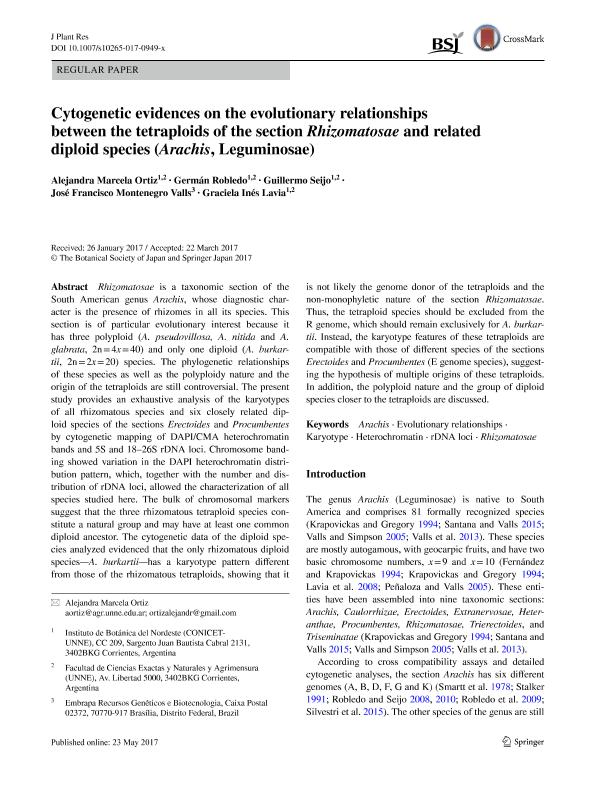Artículo
Cytogenetic evidences on the evolutionary relationships between the tetraploids of the section Rhizomatosae and related diploid species (Arachis, Leguminosae)
Ortiz, Alejandra Marcela ; Robledo Dobladez, Germán Ariel
; Robledo Dobladez, Germán Ariel ; Seijo, José Guillermo
; Seijo, José Guillermo ; Valls, José Francisco Montenegro; Lavia, Graciela Inés
; Valls, José Francisco Montenegro; Lavia, Graciela Inés
 ; Robledo Dobladez, Germán Ariel
; Robledo Dobladez, Germán Ariel ; Seijo, José Guillermo
; Seijo, José Guillermo ; Valls, José Francisco Montenegro; Lavia, Graciela Inés
; Valls, José Francisco Montenegro; Lavia, Graciela Inés
Fecha de publicación:
05/2017
Editorial:
Springer Tokyo
Revista:
Journal of Plant Research
ISSN:
0918-9440
e-ISSN:
1618-0860
Idioma:
Inglés
Tipo de recurso:
Artículo publicado
Clasificación temática:
Resumen
Rhizomatosae is a taxonomic section of the South American genus Arachis, whose diagnostic character is the presence of rhizomes in all its species. This section is of particular evolutionary interest because it has three polyploid (A. pseudovillosa, A. nitida and A. glabrata, 2n = 4x = 40) and only one diploid (A. burkartii, 2n = 2x = 20) species. The phylogenetic relationships of these species as well as the polyploidy nature and the origin of the tetraploids are still controversial. The present study provides an exhaustive analysis of the karyotypes of all rhizomatous species and six closely related diploid species of the sections Erectoides and Procumbentes by cytogenetic mapping of DAPI/CMA heterochromatin bands and 5S and 18–26S rDNA loci. Chromosome banding showed variation in the DAPI heterochromatin distribution pattern, which, together with the number and distribution of rDNA loci, allowed the characterization of all species studied here. The bulk of chromosomal markers suggest that the three rhizomatous tetraploid species constitute a natural group and may have at least one common diploid ancestor. The cytogenetic data of the diploid species analyzed evidenced that the only rhizomatous diploid species—A. burkartii—has a karyotype pattern different from those of the rhizomatous tetraploids, showing that it is not likely the genome donor of the tetraploids and the non-monophyletic nature of the section Rhizomatosae. Thus, the tetraploid species should be excluded from the R genome, which should remain exclusively for A. burkartii. Instead, the karyotype features of these tetraploids are compatible with those of different species of the sections Erectoides and Procumbentes (E genome species), suggesting the hypothesis of multiple origins of these tetraploids. In addition, the polyploid nature and the group of diploid species closer to the tetraploids are discussed.
Archivos asociados
Licencia
Identificadores
Colecciones
Articulos(IBONE)
Articulos de INST.DE BOTANICA DEL NORDESTE (I)
Articulos de INST.DE BOTANICA DEL NORDESTE (I)
Citación
Ortiz, Alejandra Marcela; Robledo Dobladez, Germán Ariel; Seijo, José Guillermo; Valls, José Francisco Montenegro; Lavia, Graciela Inés; Cytogenetic evidences on the evolutionary relationships between the tetraploids of the section Rhizomatosae and related diploid species (Arachis, Leguminosae); Springer Tokyo; Journal of Plant Research; 5-2017; 1-17
Compartir
Altmétricas



